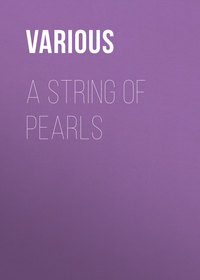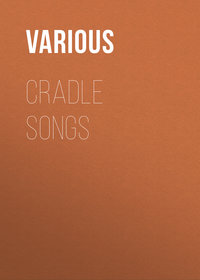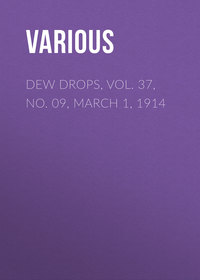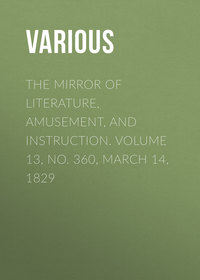Полная версия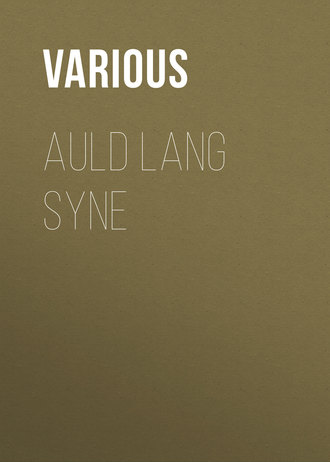
Купить и скачать
Добавить В библиотеку
Auld Lang Syne
Автор:
Жанр:
Год написания книги: 2017
Тэги:
Настройки чтения
Размер шрифта
Высота строк
Поля
THE FOOTPATH
IRemember how, the winter through, While all the ways were choked with mire,Half-maddened at the rain, we two Have nestled closer to the fire,And talk’d of all that should be doneWhen April brought us back the sun, What gardens white with butterflies, What soft green nooks of budded heather, What moorlands open to the skies, We two would scour together!IIAnd now the month comes round again! Cool interchange of genial hours,Soft gleams of sunlight, streams of rain, Have starred the meadow-lands with flowers,And in the orchards on the hillsThe grass is gold with daffodils, And we have wander’d, hand in hand, Where sea below and sky above Seem narrowing to a strip of land The pathway that we love!IIIOur path looks out on the wide sea, And knows not of the land; we sitFor hours in silent reverie, To watch the sea, and pulse with it;Its deep monotonous refrainBrings melancholy, almost pain: We scarcely wish to speak or move, But just to feel each other there, And sense of presence is like love, And silence more than prayer.IVSharp round the steep hill’s utmost line It winds, and, just below, the grassSinks with tumultuous incline To where the rock-pools shine like glass;The tufts of thrift can drink their fillOf sea-wind on this rugged hill, And all the herbage, toss’d and blown, Is stain’d with salt and crush’d with wind, Save where behind some boulder-stone A harbour flowers may find.VThe bright sea sparkles, sunbeam-kiss’d, And o’er its face such breezes floatAs lightly turn to amethyst The pearl-grey of a ring-dove’s throat;Thus stirr’d and ruffled, shines anewThe radiant plain of changing hue, So gentle, that the eye divines No reason why the foam should fall So loudly, in such serried lines, Against the dark rock-wall.VIThe wind is low now; even here, Where all the breezes congregate,The softest warbler need not fear To linger with its downy mate;And here where you have long’d to beSo many weeks and months with me, Sit silently, or softly speak Or sing some air of pensive mood, Not loud enough to mar or break This delicate solitude.VIIAre we not happy? Sun-lit air, Soft colour, floods of dewy light,A flowery perfume everywhere Pour out their wealth for our delight;Through dreary hours of snow and sleetThe hope of these wing’d winter’s feet; We have them now! The very breath Of Nature seems an altar-fire That wakes the bright world’s heart from death To satiate our desire!VIIISing to me, therefore, sing or speak! Wake my dull heart to happiness;Perchance my pulses are too weak To stir with all this sweet excess!Perhaps the sudden spring has comeToo soon, and found my spirit dumb! Howe’er it be, my heart is cold, No echo stirs within my brain, To me, too suddenly grown old, This beauty speaks in vain!IXWhy are you silent? Lo! to-day It is not as it once hath been;I cannot sit the old sweet way, Absorbed, contented, and serene;I cannot feel my heart rejoice,I crave the comfort of your voice! Speak, speak! remind me of the past! Let my spent embers at your fire Revive and kindle, till at last Delight surpass desire!XYea! are you silent, only press My hand, and turn your face away;You wince, too, from the fierce caress That April flings on us to-day?O human heart, too weak to bearThe whole fulfilment of a prayer! This sudden summer strikes us dumb; The wild hope, realized, but scares! The substances of dreams become A burden unawares.XIHow can we sit here and not thrill With but the pleasure of past time?This footpath winding round the hill Should stir us like remember’d rhymeNay! for the dull and sluggish brainIs spurred to action all in vain, And when the spirit cannot rise Through natural feeling into light, No perfumed air, no splendid skies, Can lend it wings for flight.XIICome, then, and leave the sovereign sea To sparkle in the laughing air;Another day its face will be No less refulgent, no less fair,And we by custom be made strongTo bear what we desired so long; To-day the slackening nerves demand A milder light, a sadder air, Some corner of forgotten land, Still winter-like and bare.XIIICome! leave our pathway for to-day, And turning inland, seek the woods,Where last year’s sombre leaves decay In brown sonorous solitudes;The murmurous voice of those dark treesWill teach us more than sun or seas, And in that twilight we may find Some golden flower of strange perfume, A blossom hidden from the wind, A flame within the tomb.THE FOOTPATH
You gave your hand to me, as throughThe low scrub-growth that spannedThe Danes’ old tower, we caught anewThe sharp salt-burdened breeze that blewAcross the reach of sand.Too proud! the grace you scorned to do,Where scarce your foot could stand; —’Twas but from sheer fatigue, I knew, You gave your hand!How well that scene comes back to view!Your cheeks’ faint roses fanned, —The gorge, – the twinkling seaward blue,The black boats on the strand;I gave you all my heart, and you — You gave your hand.A TURN OF THE TIDE
Only a turn of the tide!I was sitting here, by myself aloneOn this rock, now hardly three hours agone,With my book on my knees, and my eyes on the sea,And my thoughts still further adrift, when he So suddenly stood by my side. The sun shone white on the sails,The waves were dimpling and sparkling in light;And I, my visions were almost as bright.But a mist is now creeping along the shore,And I shiver with cold – it is nothing more; If it were – what now avails? Only one turn of the tide!He told me his love was so deep and strong,That in saying him nay, I did him wrong,That I had not the right his life to break,And before I half knew the words I spake I had promised to be his bride. I can see his footprints yet;Though the stealthy waves have almost effacedFrom the sand’s dry bed the track they traced,But I feel as if years had gone over my head,As if I had died, and been raised from the dead, Since those sands were glistening wet. Only a turn of the tide!Is it always so when our dreams come true?Is the present so grey, and the future so blue?Is the rainbow we chased nought but drizzling mist?And the hope we hugged to our hearts and kiss’d, Delusion, and nought beside? I had liked him truly for years,I know he is greater and nobler than I,With a larger brain and a clearer eye;That my life is of small account, if it giveHim comfort; but shall I, so long as I live, Feel these half-unreasoning fears? Ah me! one turn of the tide!This morning I was a careless child,So gay, so petted, so thoughtless and wild;I’m content with my fate, but one more yearOf freedom would have been very dear. Was it I, or the wind that sigh’d? I thought so – here comes the rain,The mist grows dense, and the clouds gather fast,And the tide has covered the sands at last;I must hasten, and think of regrets no more,But – could all things be as they were before, I would not promise again.THE TURN OF THE TIDE
Far up the shingle crept the cruel wave,With seeming coy reluctance to his feet,Which – faint with toiling in the noonday heat —He let his foe with flattering murmur lave,Nor sought to flee the cool and pleasant grave Its soft arms laid about him, nor to cheat The patient billow of its victim meet,For he had lost all power himself to save.When, while he waited, thinking death was slow, Eyesight and hearing dim with tired despair,The whisper of the sea grew faint and low, And, waked by stirring of the evening air,He rose, and saw the waves in sunset glow, Gleaming far off in beauty new and rare.THE TURN OF THE TIDE
IThe harbour lights are dim with smoke Which hangs about the under sky,And wraps the simple fisher-folk In lurid mist as they go by.Along the shore the wind blows free,Keen twilight kisses the wan seaFar out; steer thither, watch with me The tender stars come out on high.IIThe sky is deepening overhead: The sail flaps loose: the wind has died:The water laps the boat like lead: Faint ripples plash against the side,And shimmer with unearthly light,The harbour lamps are out of sight;We drift into a starless night Together on the ebbing tide.IIIHow still – how strange – the tide is slack, We eddy round – we drift no more.What swell is this which sweeps us back To where the gathering breakers roar?About the pale unlighted land?Can any tell if we shall standSafe in the morning hand in hand Upon the steep and rock-bound shore?COMPROMISE
“Come, promise, dear,” I whispered low, “That you will take my name.”I never said I’d give it, but They swore ’twas all the same.They brought an action to extort Four thousand pounds from me —The Judge said “compromise,” and so I had to give her three.By my hard fate, unwary youth, Take warning, and be wise:Once with “come promise” you begin, The end is compromise.FAREWELL
Far through the vista of receding yearsI dimly catch a glimpse through falling tears,Of faces bending o’er some pictured gloryOr – brightly list’ning to some magic story,Told by a gifted wielder of the PenWhose power and pathos touch’d the hearts of men.But when the pathos ’gan to sadden all,A comic writer would our smiles recall:And by his clever travesty and fableExcite a merry laughter round the table.Then some philosopher with voice sonorousWould read an essay – not too long, to bore us.The papers read, around the board we press’d,To scan the pictures of each artist-guest.Then to discussion of a slight repastOf fish and rolls, and velvet cream we’d haste,Ere Pens and Pencils all would speed away,To meet again some happy future day.That day, alas! has pass’d, the night has come,And witty Pens and Pencils all are dumb.1
Although Mazzini was not a member of Pen and Pencil, he wrote this letter at the request of the President.



